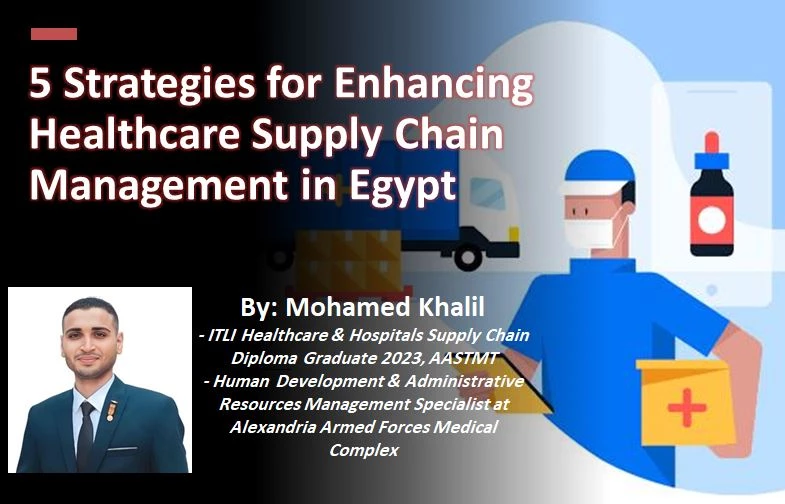
ITLI Listicle Articles | 5 Strategies for Enhancing Healthcare Supply Chain Management in Egypt
Written By: Mohamed Khalil Ibrahim Sharaf
- ITLI Healthcare & Hospitals Supply Chain Diploma Graduate 2023, AASTMT
- Human Development & Administrative Resources Management specialist at Alexandria Armed Forces Medical Complex
Editor: Dr. Mahmoud Mansi
Efficient and effective supply chain management is crucial for the success of any healthcare system. In Egypt, the healthcare sector is continuously evolving, and with the increasing demands and challenges, it becomes essential to enhance the supply chain management to ensure the availability of quality healthcare products and services. This article explores five key levers that can significantly improve health care supply chain management in Egypt.
1. Optimizing Egyptian Healthcare Supply Chain with Point of Use Data Capture
Implementing point of use data capture systems can revolutionize the supply chain management in Egyptian healthcare facilities. This lever involves using technology, such as barcode scanning or RFID, to capture data at the point of care, including patient information, medication usage, and inventory levels. By collecting real-time data, healthcare providers can gain insights into consumption patterns, identify areas of waste, and make informed decisions to optimize inventory levels and streamline the supply chain processes.
2. Enhancing Coordination: The Control Tower Approach for Egyptian Healthcare Supply Chain
Establishing a control tower approach can enhance coordination and visibility across the entire healthcare supply chain in Egypt. A control tower acts as a central hub that integrates data from various stakeholders, including manufacturers, distributors, healthcare facilities, and regulatory authorities. This lever enables real-time monitoring of inventory levels, demand forecasting, and supply chain performance, allowing for proactive decision-making, timely interventions, and efficient resource allocation.
3. Streamlining Egyptian Healthcare Supply Chain through Clinical Variation Management
Addressing clinical variation is crucial in optimizing the healthcare supply chain in Egypt. Clinical variation refers to the differences in treatment protocols, procedures, and product preferences across healthcare providers. By standardizing clinical practices and promoting evidence-based medicine, healthcare organizations can streamline their supply chain by reducing the number of product variations, improving inventory management, and negotiating better pricing with suppliers. This lever also ensures consistent quality of care and reduces the risk of errors or complications.
4. Efficient Inventory Management for Egyptian Healthcare Supply Chain
Effective inventory management plays a vital role in ensuring the availability of essential healthcare products while minimizing costs and waste. Implementing strategic inventory management practices, such as just-in-time (JIT) inventory, demand-driven replenishment, and automated inventory control systems, can optimize stock levels, reduce carrying costs, and prevent stockouts or overstocking. This lever requires collaboration between healthcare providers, suppliers, and distributors to establish reliable forecasting methods, streamline procurement processes, and implement efficient storage and distribution systems.
5. Building Strong Supplier Relationships for Egyptian Healthcare Supply Chain
Strong and collaborative relationships with suppliers are essential for a robust healthcare supply chain in Egypt. Building partnerships based on trust, transparency, and mutual goals can lead to improved product availability, competitive pricing, and enhanced customer service. This lever emphasizes the need for regular communication, joint planning, and performance monitoring with suppliers. By working closely with suppliers, healthcare organizations can identify opportunities for process improvement, negotiate favorable terms, and ensure the timely delivery of quality products.
Conclusion:
Improving health care supply chain management in Egypt is crucial to meet the growing demands of the healthcare sector. By leveraging the five key levers mentioned above - point of use data capture, control tower coordination, tackling clinical variation, strategic inventory management, and enhancing supplier relationships - healthcare organizations can optimize their supply chain processes, reduce costs, enhance patient safety, and ultimately improve the quality of healthcare services. It is essential for stakeholders in the Egyptian healthcare system to embrace these levers and work collaboratively towards a more efficient and sustainable supply chain.
References: Five levers to improve supply chain management - Healthcare - PwC UK blogs
To know more about the academic and professional programs of the International Transport and Logistics Institute (ITLI), please visit the following:
Webpage | LinkedIn | Facebook | Instagram


